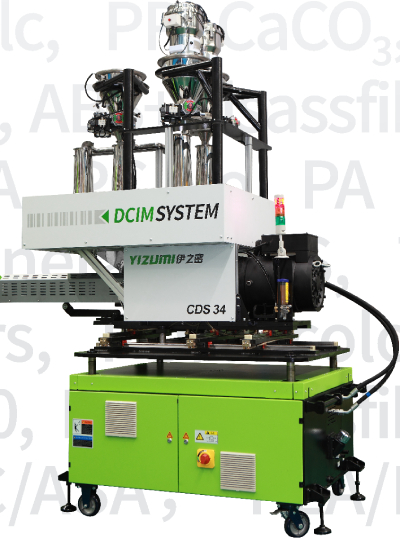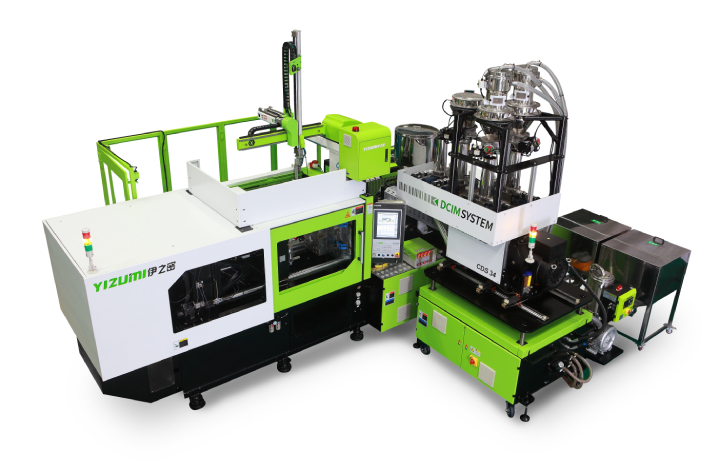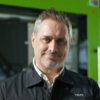Direct compounding becomes practical and affordable
Abstract:
Direct compounding becomes practical and affordable
Direct compounding becomes practical and affordable
(Direct compounding injection molding connected to mass production level of injection molding machine)
An injection-molding manufacturer in southern Germany has been looking for a noise-absorbing, high-filling polypropylene polymer, and finally got it on Exipnos, a supplier in Messerburg, Saxony-Anhart. However, as Exipnos general manager Peter Putsch admits, "The 1, 000 tons of capacity you need per year is more than our blender's capacity. We focus on small and medium production volumes."
Nevertheless, Peter Putsch was able to offer his new customer a solution: "Just make our compound directly on your injection molding machines!"

The DCIM system can be directly compounded on almost every injection molding machine.
(Source: Yizumi Company)
The surprising proposal made the customer more curious, putsch Peter explained to him the underlying concept of Direct Compounding Injection Molding (DCIM) in details: "All you need is a compounding module. This Compound Delivering System or CDS is docked to an injection molding machine of the required size. We can provide you with recipes, programming of ingredient modules and supply sources of necessary raw materials ".
The trade-off between cost and environment is proving particularly exciting: "Unlike traditional plastic production chains, which do not require cooling, pelleting, transport and remelting before injection molding, savings of around 35 euro cents /Kg can be achieved, as calculated by experienced smelters, by 1,000 tons of material per year, or around 350,000 euros."
By eliminating these energy-intensive steps, about 264 kilograms of carbon dioxide are saved per ton of plastic processed. With this in mind, the head of product management at Yizumi, Mr. Timo Gunzel said: "This is increasingly becoming a key competitive advantage in the market as environmental initiatives and industries demand transparency on the carbon footprint of goods and services in more and more countries."
The Chinese company became the first supplier in the world to implement the concept of direct compounding in standard modular systems, taking advantage of the collaboration between the German R&D center and DCIM prototype system provider Peter Putsch. At the K show 2019, the group, which is listed on the ChiNext and operates in more than 60 countries, celebrated its world premiere of the DCIM scheme with UN160A5-EU three-board precision servo injection molding machine equipped with CDS 34. For a week, visitors in Düsseldorf were able to follow the live interaction of the patented direct compounding module with a standard injection molding machine. The booths were crowded most of the time, and there was great demand for coffee mugs made of biodegradable plastic. “We have more than 200 technical discussions with customers from all over the world," Mr Gunzel said.
"Currently, the second is in production, and the next-larger module called CDS 68 with a shot weight of 1,000 grams". the product manager offers an outlook on the further expansion of the product range. By the end of the year, the "CDS 102 with a shot weight of 3,000 grams will be available," he added. If the customer requests, the injection volume of CDS 136 from 2021 will also be higher.
Günzel points to another advantage, that each CDS could be linked to "an injection molding machine of the right size from any manufacturer". Processors therefore did not have to invest in new injection molding machines. Thanks to a mobile bearing on rollers and a frame construction that can be moved in two axes, even the changing use of a CDS on several machines is possible. In addition, the connection concept allows the flexible production operation of the SGM concerned, without or in combination with the CDS module. "No entrepreneur has to choose between direct compounding and conventional production, rather, he expands his options on the same system to the greatest possible extent ."
Faced with the concerns of many injection molders taking on additional responsibilities and also compounding risks brought to the workshop, Yizumi provides convenient, full-service solutions, Günzel clarified: "For the required compounds, the customer will obtain from us a complete formulation, a certified purchase route for the required raw materials, and a chemical-specific procedure for controlling CDS and the entire system if they need." Ultimately, users only have to ensure that the loaders are always sufficiently filled with the right materials. "The machine can do all the other work," says Günzel.

The CDS-34 model with an injection volume of 500 g can recover the cost within a few months.
(Source: Yizumi Company)
At the same time, the intuitive operating concept via graphical panels "opens up the possibility to intervene in the process at any time, for example to adapt the material to the changed needs of clients," added Peter Putsch, who has been working with the system every day for a long time: "Instead of copying an existing compound, ordering a new one, and then having to wait for days or weeks for delivery, the injection machine now typically receives the modified mixture with a few taps or downloading the appropriate control software." If customers want to control their CDS completely by themselves, they can attend appropriate training courses which Yizumi offers.
In order to be able to fulfill the all-round carefree promise of machine-controlled direct compounding, Mr. Putsch is now commissioning Yizumi to sample hundreds of basic formulations of plastic materials for use in DCIM systems. Mr Gunzel drew up "the most common formula tables with the type of polypropylene that is filled in" and the current interim assessment report includes "an assessment of the entire interior and exterior of the vehicle". Currently, the Merseburger Exipnos Technical Centre is running test series with glass-fibre-reinforced and biodegradable compounds, and by the end of the year, the most common blends for the digital recipe database are to be prepared for the market.
The general manager of Exipnos believes that his traditional business is changing in terms of composites. He believes prefabricated composites will still make sense in some areas. But he thinks his company is becoming the system home of direct composite technology. "Exipnos will sell fewer granules in the future, but more know-how and services," predicts Putsch. "Not because we want it, but because the benefits of DCIM technology can no longer be ignored."
Retrieved from
https://www.plastverarbeiter.de/98051/direktcompoundieren-wird-praktikabel-und-erschwinglich/





